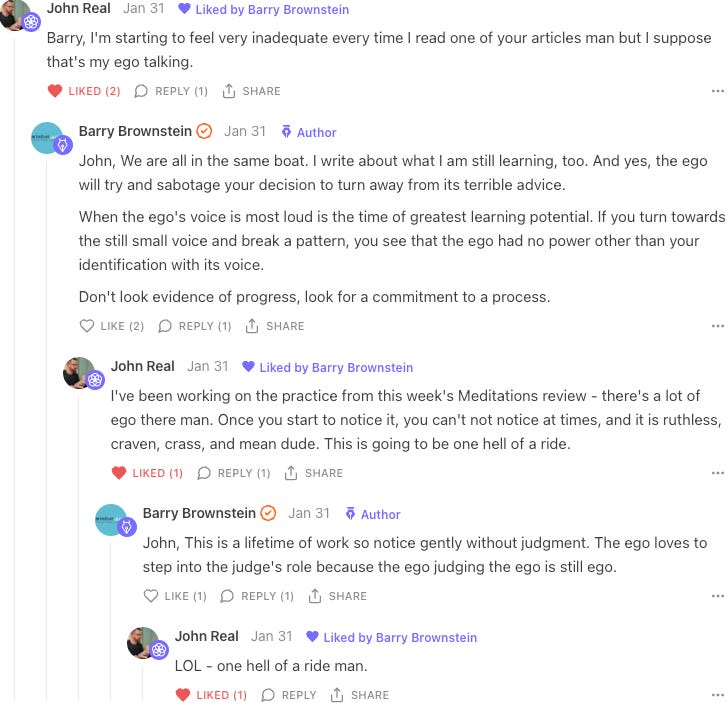Meditations Session 2: The Joy of Missing Out
"Be patient toward all that is unsolved in your heart."
Thank you for your rich contributions to our threads this past week. I’m looking forward to even more joining in this week.
John and I had an exchange this week that you might find instructive:
Reading John's messages reminded me of former leadership students who told me humorously that I had screwed them for life. Having learned what they did, they could never go back to seeing the world in the same way. They didn’t want to return. Their joke reflected the profound internal change they were experiencing.
The price of admission for this internal change was seeing that blaming others for their feelings was a habit designed to strengthen a false identity and not their Nature. Such a shift in mindset almost always happens in a process over time and not in one momentous decision.
In his Letters to a Young Poet, Rainer Maria Rilke offers us compassion on what can be a challenging journey:
Be patient toward all that is unsolved in your heart and try to love the questions themselves, like locked rooms and like books that are now written in a very foreign tongue. Do not now seek the answers, which cannot be given you because you would not be able to live them. And the point is, to live everything. Live the questions now. Perhaps you will then gradually, without noticing it, live along some distant day into the answer.
In Notebook 3, entry 4, Marcus, as he often does, provides an aspiration to guide us. He understood he had not reached a goal he had set for himself. Read out of context, it might sound like Marcus is scolding himself to just stop it already (See Session 1 and Session 1.2). He is not. Just stop it is not guidance for any of us. Marcus reminds himself (and us) of a process:
You have to exclude everything purposeless and random from the sequence of your thoughts, but especially and above all anything prompted by idle curiosity or ill will. You must get into the habit of restricting your thoughts to those that are such that if you were suddenly asked, “What are you thinking?” you could answer, frankly and without hesitation, “X” or “Y,” and it would immediately be clear from your reply that all your thoughts are guileless and kindly, the thoughts of a sociable creature who disdains pleasurable or any kind of self-indulgent fantasies and is untouched by rivalry, malice, suspicion, or anything else that one would blush to admit one had in mind.
A gentle process of awareness is called for, not haranguing ourselves for our failures to reach, for now, unattainable goals. Our feelings of frustration about our human frailties slow, not advance, our progress. Following Marcus, we must guard our attention against false impressions and be guided by “justice, honesty, moderation, and courage.” (3.6) Marcus refers to the “guardian spirit” that offers guidance and the “command center” that makes right-minded decisions.
In 3.7, he provides a helpful rule for self-discipline: “Never count something to your advantage if it’s ever going to force you to break a promise, relinquish your modesty, hate or suspect or curse anyone, dissemble, or desire something that needs to be concealed behind walls or curtains.”
In 3.9, he again reminds us that although we often pretend otherwise, we have the power of choice: “Revere your faculty of judgment. Insofar as your command center is now free of judgments that are not in accord with nature and the constitution of a rational being, this is entirely its doing.”
Then, Marcus gave us practical advice consistent with our Session 1 practice. A practice that will help reveal all that is in the way of our true Self.


